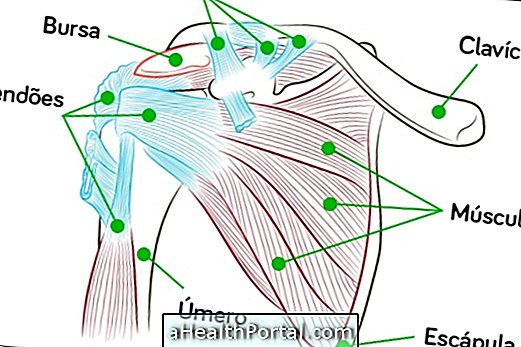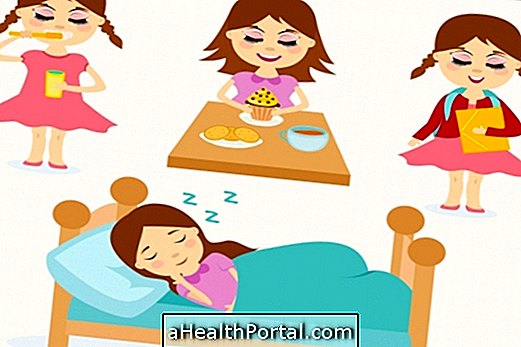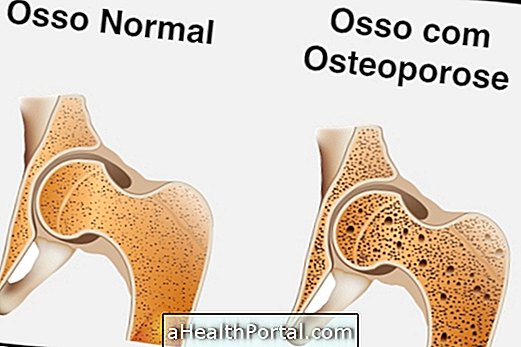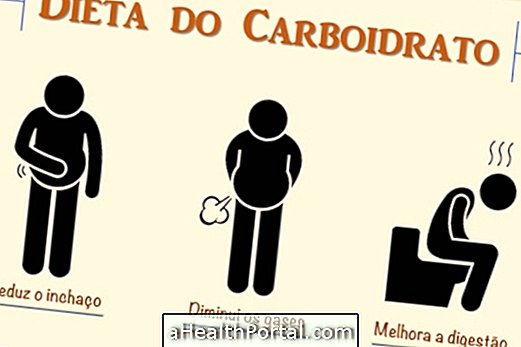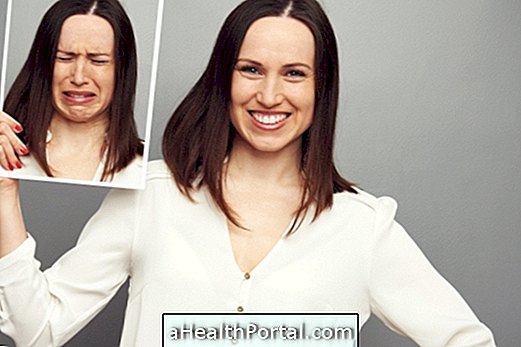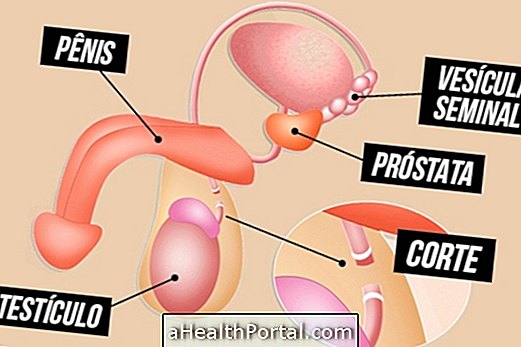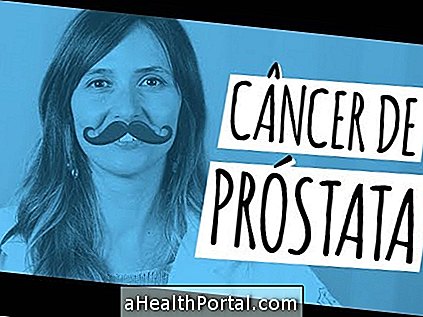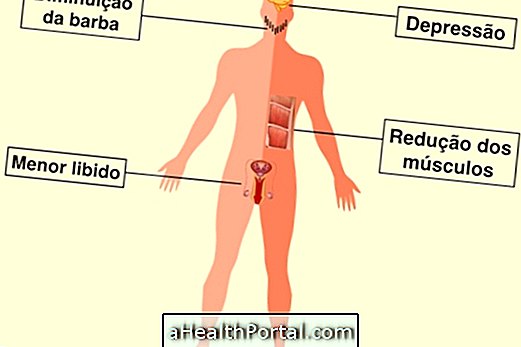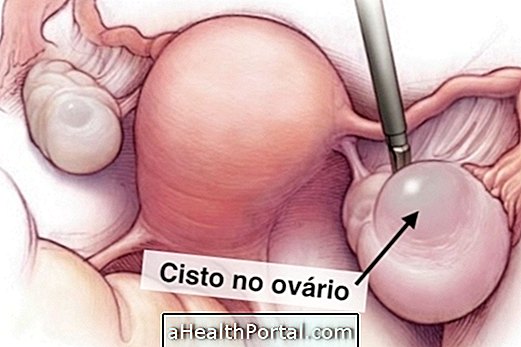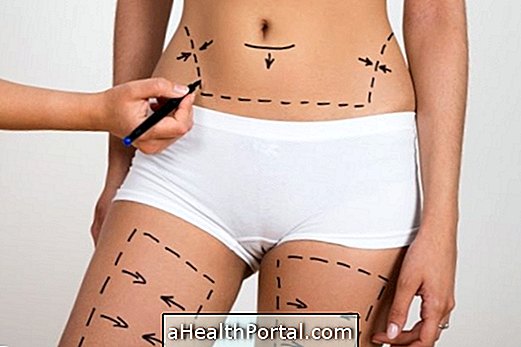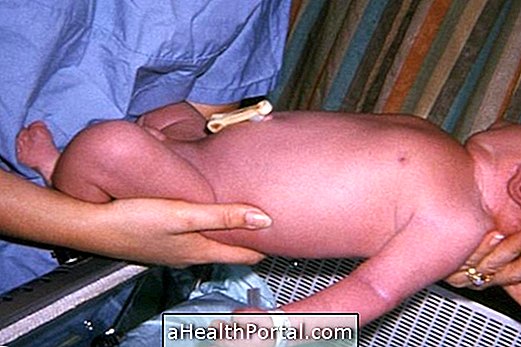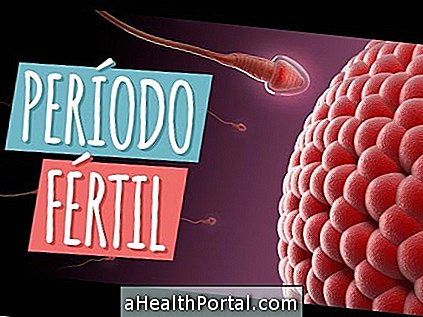- Depression is a relatively common psychological disorder that causes persistent sadness and prevents the performance of daily tasks.
- Depending on the intensity of the symptoms, depression can be divided into mild, moderate or severe.
- It can appear at any age, from children to adults and the elderly.
- Depression can be cured, but treatment takes time and can include psychotherapy, medications, seizures and some natural therapies.
What is depression?
Depression is a relatively common psychological disorder that is characterized by persistent sadness and a lack of interest in performing activities that were previously considered fun.
Although sadness is a normal emotion, in depression this sadness is so strong and lasts for so long that it ends up affecting the whole person's life, even preventing the performance of basic daily tasks such as sleeping or eating.
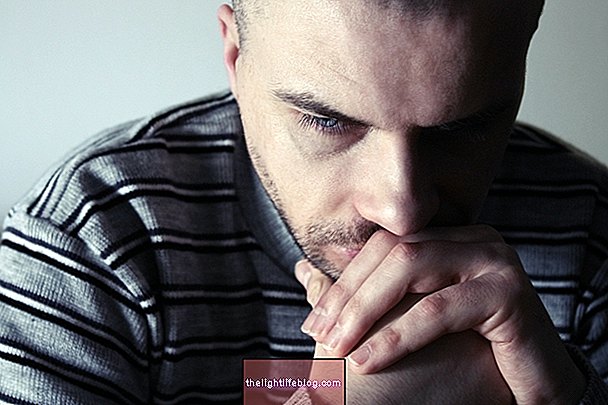
Main symptoms of depression
The main symptoms of depression include:
- Feeling sad, anxious or "empty";
- Have frequent feelings of hopelessness or pessimism;
- Being easily irritated;
- Not having the desire to do activities that were fun before;
- Feeling without energy and very tired;
- Sleep a few hours a night or sleep for an excessive amount of time;
- Having difficulty concentrating and memory;
- Feeling more or less appetite than usual;
- Having suicidal thoughts.
People with depression usually experience several of these symptoms most of the day, almost every day of the week and for more than two weeks in a row.
Depending on the intensity of the symptoms, depression can be divided into "adaptation disorder with depressed mood", popularly known as mild depression, when the depressive episode causes some difficulty to continue a simple task or social activity, "major depressive disorder" or "dysthymia", when symptoms affect personal and social activities, such as work and family, in addition to daily tasks.
All types of depression must be properly diagnosed and treated by a psychologist and / or psychiatrist.
Online depression test
To find out if there is a risk of being depressed, answer the questions:
- 1. I feel like I like to do the same things as before
No Yes
- 2. I laugh spontaneously and have fun with funny things
No Yes
- 3. There are times during the day when I feel happy
No Yes
- 4. I feel like I have a quick thought
No Yes
- 5. I like to take care of my appearance
No Yes
- 6. I feel excited about good things to come
No Yes
- 7. I feel pleasure when I watch a program on television or read a book
No Yes

What Causes Depression
There is no specific cause for the onset of depression, but this disorder tends to be more frequent when there is a set of genetic, biological, environmental and psychological factors that make a person more predisposed to depression.
Some of the most important factors for depression are:
- Having cases of depression in the family;
- Having suffered a traumatic or very stressful episode, such as sexual abuse or the loss of a family member;
- Be going through a phase of great changes;
- Excessive use of alcohol or drugs;
- Having any serious or chronic illness, such as cancer;
- Make use of some types of medications.
In addition, some studies also indicate that depression can arise due to chemical imbalances in the brain, namely in the concentrations of the neurotransmitters serotonin, norepinephrine and dopamine.
Depression at different stages of life
Depression can arise at any time in life and affect people of all ages. However, it is more frequent in the stages of life where there is a greater number of changes such as:
Childhood depression
Although less frequent, childhood depression can occur in children who have experienced traumatic moments during childhood, such as problematic parents' divorce or moments of verbal or physical violence.
Signs of depression in childhood may be more difficult to identify than in other stages of life, but they tend to include a sad face, unwillingness to play, easy tantrums, difficulty sleeping, lack of appetite and even difficulty holding a pee. or the poop.
Adolescent depression
Adolescent depression is slightly more common than childhood depression, as the adolescent goes through several physical and psychological changes that can facilitate the onset of depression. In addition, other factors also increase the risk of depression such as taking drugs, being bullied at school or being under pressure to succeed.
The adolescent himself can identify that he is getting depressed, but depression can also be identified by parents, friends or teachers through signs such as constant tiredness, memory problems, frequent crying or lack of interest to go out with friends, for example.
Depression in pregnancy
After adolescence, pregnancy is another of the most striking phases in a woman's life and, for this reason, depression in pregnancy is more and more frequent. Depression at this stage is characterized by feelings of anxiety and sadness, which can result in disinterest in the pregnancy and put the baby's development at risk.
Although it can happen to any woman, due to the rapid hormonal changes, depression is more common in pregnant women who lack emotional support, who did not want the pregnancy or who do not have any assistance during pregnancy.
Baby blues
Postpartum depression can happen up to 6 months after the baby is born and is usually caused by the woman's fear of becoming a mother and new responsibilities. However, it can also happen due to other factors, such as having little family support, having gone through stressful moments in pregnancy or having low socioeconomic status.
In addition to the classic symptoms of depression, women who suffer from postpartum depression tend to pay little attention to the baby and are unable to take care of themselves or their child.
How is the treatment for depression
Treatment for depression should always be guided by a psychologist and / or a psychiatrist, which may vary according to the age and intensity of the symptoms. In milder cases of depression, psychotherapy is usually indicated, leaving medications and other therapies for situations with more severe symptoms.
The most used treatment options are:
1. Psychotherapy
Psychotherapy consists of conducting sessions in the psychiatrist's or psychologist's office, which aim to help deal better with emotions and feelings, stimulating self-knowledge and resolving internal conflicts that may be at the origin of depression.
Psychotherapy may be sufficient to treat cases of mild depression, but it is also essential in cases of severe depression, even if medications are already being used, as it helps to reorganize thoughts, feelings and emotions.
2. Antidepressant remedies
The drugs used to treat depression are known as antidepressants and help to regulate some chemicals in the brain, which allows better control of emotions and stress.
The doctor may also recommend the use of other medications, such as anxiolytics or antipsychotics, depending on the symptoms presented.
3. Electroconvulsive therapy
Electroconvulsive therapy is usually used in the most severe cases, when the use of drugs and psychotherapy is not enough to relieve the symptoms of depression or when there is a tendency towards suicide. This type of therapy consists of applying small electrical impulses that act on the brain.
Although it appears to be a dangerous therapy, electroconvulsive therapy is always performed following a strict protocol that allows the preservation of the health and integrity of each patient, and a clinical study of each person must be carried out prior to treatment. However, there are some side effects like headache, nausea, muscle pain and, in some cases, permanent mental blackouts.
4. Alternative therapies
Alternative therapies, such as acupuncture or meditation, can also be used as a way to enhance the effects of medical treatment of depression, as they help to better deal with stress and anxiety.
The ideal is that the use of this type of therapies is always supervised by the responsible means for the treatment.
Natural treatment for depression
In addition to the treatments indicated by the media and the alternative therapies that can be used, there are also some natural ways to help relieve symptoms. One of these forms is the regular practice of physical exercise, which should be done 3 to 5 times a week, for at least 30 minutes a day.
In addition, there are also some supplements and medicinal plants that can help such as St. John's wort, damiana or valerian. Ideally, the use of supplements and medicinal plants should only be done under the supervision of a doctor and a health professional accustomed to the use of medicinal plants.
Can depression be cured?
Depression is considered a chronic disease because it can last for several months and even years, however, depression is curable especially in the milder cases that receive treatment since the onset of symptoms. However, in the most severe cases, treatment may need to be continued for several years.
The abandonment of the use of medications, as well as psychotherapy, are the main attitudes that are responsible for the increase in treatment failure rates.
How to help someone with depression
The emotional support of family, friends and close people is one of the most important pillars of depression treatment, which can help to shorten treatment time.
Some attitudes that can help someone with depression include:
- Look for information about depression;
- Make the other person comfortable;
- Recommend the search for a therapist and encourage him to continue the treatment;
- Participate in relaxation techniques with the person;
- Stimulate the positive effects of treatment.
Knowing how to act in the face of a person with depression can be difficult. Thus, it is best to always meet with the doctor who is guiding the treatment so that he can inform how family and friends can help in each specific case.
Was this information helpful?
Yes No
Your opinion is important! Write here how we can improve our text:
Any questions? Click here to be answered.
Email in which you want to receive a reply:
Check the confirmation email we sent you.
Your name:
Reason for visit:
--- Choose your reason --- DiseaseLive betterHelp another personGain knowledge
Are you a health professional?
NoMedicalPharmaceuticalsNurseNutritionistBiomedicalPhysiotherapistBeauticianOther
Bibliography
- VIRTUAL LIBRARY OF THE MINISTRY OF HEALTH. Depression. 2005. Available at:. Accessed on 05 Nov 2020
- WHO. Depression. Available in: . Accessed on 05 Nov 2020
- NATIONAL INSTITUTE OF MENTAL HEALTH. Depression. Available in: . Accessed on 05 Nov 2020
- PAN AMERICAN HEALTH ORGANIZATION. Depression. Available in: . Accessed on 05 Nov 2020
- NATIONAL ALLIANCE ON MENTAL ILLNESS. Depression. Available in: . Accessed on 05 Nov 2020
-o-que--quando-fazer-e-como-funciona.jpg)


